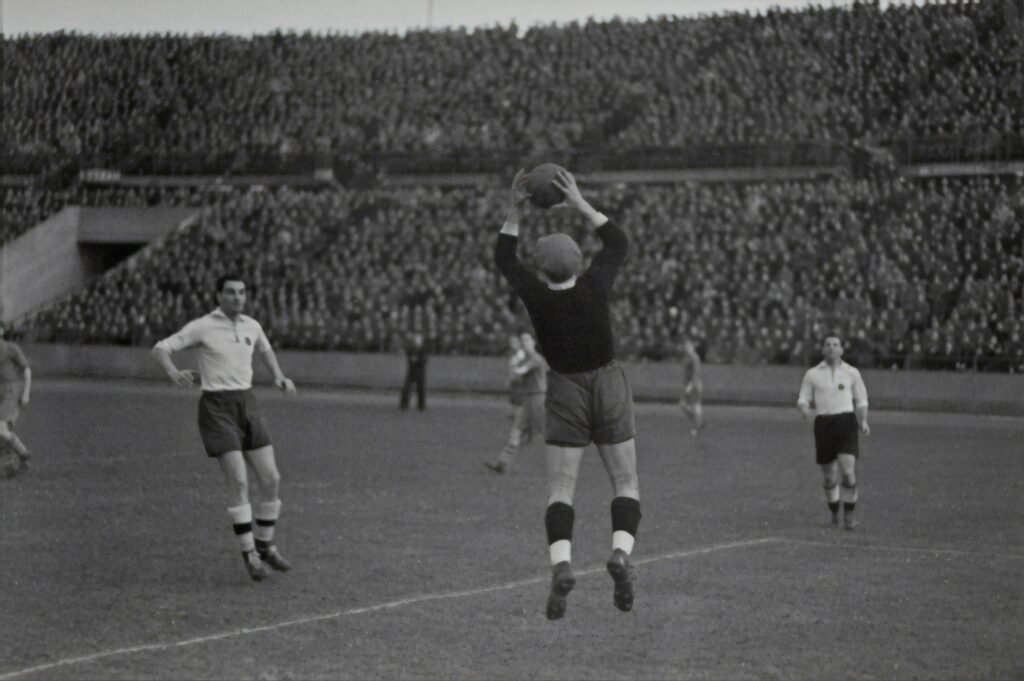In the ever-evolving world of sports, artificial intelligence has emerged as a game-changer. From enhancing player performance to revolutionizing fan engagement, AI is making its mark in every aspect of the game. Whether it’s advanced analytics, virtual reality training, or predictive modeling, the impact of AI on sports is undeniable. With its ability to analyze vast amounts of data and improve decision-making, AI is reshaping the way athletes train, teams strategize, and fans experience their favorite sports. In this article, we will explore the various ways in which artificial intelligence is transforming the sports industry, and how it is paving the way for a future where technology seamlessly blends with athleticism.

Introduction
Artificial Intelligence (AI) has revolutionized various industries, and the world of sports is no exception. With its advanced algorithms and data analysis capabilities, AI has proven to be a game-changer in sports analytics, enhancing fan engagement, improving training and coaching methods, assisting referee decisions, advancing sports equipment, optimizing athlete performance, and addressing ethical considerations. In this article, we will explore the role of AI in these different aspects of sports, discussing its benefits, advancements, and potential challenges.
1. The Role of Artificial Intelligence in Sports Analytics
1.1 Advanced Data Collection
AI has greatly enhanced the data collection process in sports analytics. Through various sensors and tracking devices, AI algorithms can collect vast amounts of data on player movements, biometrics, game statistics, and environmental factors. This data provides valuable insights for teams and coaches to optimize training programs and improve player performance.
1.2 Analyzing Player Performance
By analyzing the collected data, AI can provide in-depth analysis of player performance. It can identify patterns, strengths, and weaknesses, allowing coaches to make data-driven decisions in team selections, tactical strategies, and player development. AI-powered analysis goes beyond simple statistics, providing detailed metrics and visualizations for a comprehensive understanding of player performance.
1.3 Predictive Analytics
AI algorithms can utilize historical data and real-time inputs to predict future outcomes in sports. This enables teams to anticipate opponent strategies, make informed tactical decisions, and ultimately gain a competitive edge. Predictive analytics also assist in injury prediction and recovery timelines, helping teams manage player health and minimize the risk of injuries.
1.4 Injury Prevention and Performance Optimization
By leveraging AI-powered analytics, teams can develop injury prevention strategies and optimize player performance. AI algorithms can identify potential risk factors for injuries based on biomechanics, load management, and other variables. This information allows coaches and trainers to create personalized training programs and adjust player workload to minimize the risk of injuries and maximize performance.
2. Enhancing Fan Engagement
2.1 AI-powered Broadcasting
AI technology has transformed the broadcasting experience for sports fans. AI algorithms can automatically generate highlights, analyze game footage, and provide real-time statistics and insights during live broadcasts. This enhances the viewing experience by offering a more interactive and immersive way to follow the game.
2.2 Personalized Viewing Experience
AI is also used to provide personalized viewing experiences for fans. With AI algorithms, broadcasters can tailor content based on individual preferences, previous viewing history, and social media interactions. This enables fans to access customized highlights, player profiles, and real-time updates specific to their interests, creating a more engaging and personalized experience.
2.3 Virtual Reality and Augmented Reality
Virtual reality (VR) and augmented reality (AR) technologies, powered by AI, offer new ways to experience sports. Fans can immerse themselves in virtual environments, watch games from different perspectives, and even participate in virtual competitions. These technologies enhance the fan experience by providing a sense of presence and interactivity that traditional broadcasting cannot match.
3. Training and Coaching
3.1 Virtual Coaches and Training Programs
AI has revolutionized the way athletes train and coaches plan strategies. Virtual coaches, powered by AI algorithms, can provide personalized training programs tailored to individual needs. These virtual coaches can analyze player performance data, optimize training schedules, and provide real-time feedback, enabling athletes to improve their skills and performance.
3.2 Real-time Feedback and Analysis
AI enables real-time feedback and analysis during training sessions and competitions. Through sensors and wearable devices, AI algorithms can provide instantaneous feedback on technique, form, and performance metrics. This allows athletes and coaches to make immediate adjustments, improving performance and reducing the risk of injuries.
3.3 Game Simulation and Scenario Planning
AI-powered game simulations and scenario planning tools allow teams to prepare for various game situations. Coaches can run simulations to analyze different strategies, evaluate player performance, and make informed decisions. These tools help teams simulate realistic game scenarios, enhancing decision-making skills and overall team performance.

4. Improving Referee Decisions
4.1 Video Assistant Referee (VAR)
AI has played a significant role in improving referee decisions through the implementation of Video Assistant Referee (VAR) systems. VAR systems utilize AI algorithms to analyze video footage and provide referees with additional information to make more accurate decisions. This has reduced errors and controversies in sports, ensuring fair play and maintaining the integrity of the game.
4.2 Offside Detection
AI algorithms can precisely detect and analyze offside situations in sports like football. By analyzing multiple camera angles and player positions, AI can determine if a player is offside with high accuracy. This eliminates human errors and prevents unfair outcomes in games, ensuring fair play and unbiased results.
4.3 Instant Replay and Decision Review Systems
AI-powered instant replay and decision review systems have become integral parts of many sports. By analyzing video footage in real-time, AI algorithms can assist referees in making accurate decisions regarding fouls, goals, and other critical game moments. This improves the overall fairness and accuracy of referee decisions, reducing controversies and enhancing the integrity of the sport.
5. Advancements in Sports Equipment
5.1 Smart Wearables for Athletes
AI-driven smart wearables have revolutionized sports equipment, providing athletes with real-time data and insights. From fitness trackers to smart helmets, these wearables collect and analyze data on biometrics, performance metrics, and environmental factors. Athletes can use this information to optimize their training, improve performance, and prevent injuries.
5.2 Impact and Biomechanics Analysis
AI algorithms can analyze the impact and biomechanics of sports equipment, ensuring player safety and performance optimization. By collecting data on forces, movements, and stresses during gameplay, AI can help manufacturers design safer and more efficient equipment. This ensures that athletes are protected while maximizing their performance potential.
5.3 Equipment Customization
AI enables personalized customization of sports equipment based on individual needs and preferences. By analyzing player data and biomechanics, AI algorithms can generate optimal designs and configurations for equipment such as footwear, gloves, and helmets. This customization enhances comfort, performance, and injury prevention for athletes.

6. AI and Athlete Performance Enhancement
6.1 Biometric Monitoring and Predictive Analytics
AI-powered biometric monitoring systems collect and analyze real-time biometric data, enabling athletes to track their physical and mental states. By combining this data with predictive analytics, AI algorithms can provide insights and alerts on fatigue, injury risks, and recovery timelines. This enables athletes to make informed decisions, optimize performance, and prevent injuries.
6.2 Training Load Optimization
AI algorithms can optimize training loads based on individual athlete data, performance metrics, and recovery rates. By analyzing this data, AI can recommend personalized training programs, adjustments to workload, and recovery strategies. This ensures that athletes train optimally, minimize the risk of overtraining or undertraining, and perform at their best.
6.3 Injury Prevention
AI plays a crucial role in injury prevention through early detection and intervention. By analyzing data on movement patterns, workload, and biomechanics, AI algorithms can identify potential risk factors for injuries. Coaches and trainers can then use this information to adjust training programs, workload distribution, and recovery plans, reducing the risk of injuries and enhancing athlete longevity.
7. Ethical Considerations and Fair Play
7.1 Data Privacy and Security
As AI continues to play a prominent role in sports, data privacy and security become paramount. Organizations must ensure that player and fan data is securely collected, stored, and used in accordance with regulations. AI systems must be designed with robust security measures to prevent unauthorized access or misuse of sensitive data.
7.2 Fairness in AI-powered Analysis
To ensure fairness, AI-powered analysis must be free from biases and discrimination. Algorithms must be trained on diverse datasets and regularly audited to mitigate any unintentional biases. Fairness in AI analysis is crucial to avoid unfair advantages or disadvantages for certain players or teams, maintaining the integrity and fairness of competition.
7.3 Ensuring Transparency and Accountability
Transparency and accountability are essential when it comes to AI in sports. Organizations should provide clear explanations of how AI algorithms are used and their impact on decisions. Additionally, there should be mechanisms in place for monitoring and auditing AI systems to ensure their accuracy and prevent any unethical use of AI in sports.
8. The Future of AI in Sports
8.1 Evolving Technologies and Applications
The future of AI in sports is filled with potential. New technologies such as machine learning, natural language processing, and computer vision will continue to drive advancements in sports analytics, fan engagement, training and coaching, equipment, athlete performance enhancement, and referee decisions. Continued research and development in AI applications will shape the future of the sports industry.
8.2 Potential Challenges and Limitations
While AI offers numerous benefits, it also presents challenges and limitations. One challenge is the ethical use of AI and ensuring that it does not create unfair advantages or disadvantages. There are also concerns about data privacy and security, as well as the potential bias and discrimination in AI algorithms. Additionally, the reliance on AI may reduce the human element in sports, which is an integral part of the game.
8.3 Opportunities for Innovation
Despite the challenges, AI in sports presents opportunities for innovation and advancement. Continued research and development can address the ethical concerns and limitations of AI, ensuring fairness and accountability. The integration of AI with emerging technologies like blockchain and the Internet of Things (IoT) can further enhance the capabilities and impact of AI in sports. Overall, AI provides a multitude of opportunities for innovation and growth in the sports industry.
10. Conclusion
Artificial Intelligence has become an integral part of the world of sports, revolutionizing various aspects of the industry. From advanced data collection and analysis to enhancing fan engagement, improving training and coaching methods, assisting referee decisions, advancing sports equipment, optimizing athlete performance, and addressing ethical considerations, AI has the potential to reshape the future of sports. While challenges and limitations exist, the opportunities for innovation and growth are vast. By embracing AI responsibly and ethically, the sports industry can unlock new possibilities and elevate the game to new heights.





